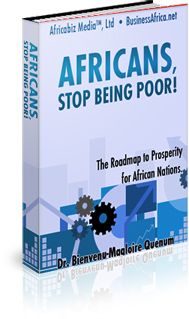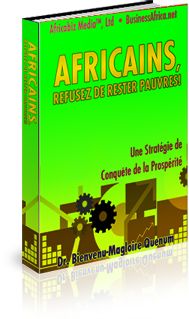|
****JavaScript based drop down DHTML menu generated by NavStudio. (OpenCube Inc. - http://www.opencube.com)****



|
| ! |
| AFRICABIZ
VOL 1 - ISSUE: 91
NOVEMBER
15 - DECEMBER 14, 2006
Previous
Issue
Editor: Dr. Bienvenu-Magloire Quenum
Click here for contact & support console
| | A
WORD FROM THE EDITOR
| | |
|
Dear visitor and international investor,
We
warmly welcome you, if this is
your first visit to Africabiz
Online - The ultimate newsletter
on trading and investing in 49
sub-Saharan African countries.
If you are a regular and faithful
reader, welcome back.
- KNOW YOUR PAST, TO COPE WITH
THE PRESENT AND PREPARE FOR A PROSPEROUS FUTURE
International meetings are held month after month, to which African delegates attend, and during which important decisions regarding the global developing of the Black continent are taken. That is particularly the case - since the 1990's - of the World Trade Organization's meetings, which are shaping a new (political and economic) world through the concept of Globalization [54, 67, 73, 83]
African countries adhered to the globalization's concept, surrendering their most valuable trump cards (taxes and duties on import and export) without receiving balancing revenues from the developed nations [54].
In the contrary, these developed countries clung to the subsidies they heavily
grant to their farmers (and industrialists.) And, by doing so, they are subsequently "blocking" the
development of viable agriculture and industrial sectors in African countries.
It is obvious African countries did not take into account the fact that the world is - and had always been - in a state of economic war; and only prevail the nations well prepared and organized to win the battle.
Therefore, international meetings are war-rooms where two warring parties (developed and underdeveloped countries) gather to confront ideas and take (binding) decisions that translate into international law and rules, which would be deciding upon the outcome of the economic battle. Each party trying to push forward its arguments to winning the final decisions that set the path and rules for world's global economic development. And of course, the developed nations do their best to argument and haggle to maintain the status quo: that is the economic domination they have astutely managed to capture since five centuries. African delegates who attend said meetings - intellectually and psychologically unprepared - are the losers.
Indeed, developed countries' delegates attending are composed of hundred of specialists whom expertise cover all the peculiarities, technicalities and aspects of questions under discussion. In the contrary, African delegates per nation number (in average) one to five maximum.
Thus, from the start, African nations are already ill-prepared to attend all planned sessions. And when one knows that some sessions drag on for hours late beyond midnight, the picture is clear: African delegates cannot attend all planned sessions and, when attending selected ones, are tired and not focused to discuss and amend proposals made by developed nations' delegates. Therefore, decisions are made that could be detrimental to final developing process of African countries. That is what happening right now with the successive WTO meetings of the Doha process.[54, 67, 73, 83]
One solution would be that delegates from all African nations pull together and dispatch experts to all planned sessions of a specific international meeting. This would require a central body to plan and coordinate, which could be the African Union's delegation. For that purpose, a long-range planning would be necessary, that would not be difficult to organize as meetings' calendars are set at least one year in advance. The delegation from African Union's Commission would then act as the coordinating body at the meeting. Intelligence technology would make the practice user-friendly.
In spite of such far-range planning, however, a gap in expertise would still exist between developed nations' delegations and Africa's ones. But that gap could be partially overcome if African delegates are perfectly aware of the fact that the world is at economic war, and are well acquainted with the strategy applied by developed countries - over centuries - to subdue and dominate Africa's developing.
Indeed, since centuries, few highly organized (European) countries have relentlessly endeavored to pull out the carpet underneath the less organized ones.
Nothing strange about that because that is the normal process: the struggle for life translated at nations' level. These enterprising organized countries are right to do their best to ensure their people's prosperity. The countries that are subjugated to economic domination (and thus indirectly to political dominance) can only put the blame on themselves. They should have never forgotten that the world is perpetually at economic war to be won only by the best organized nations. Therefore, they should have been always on constant alert, striving to find ways, means and proper offensive and defensive strategies to defend their own interests. And unfortunately, Africa is the one continent
that had suffered from the (economic) domination strategy set up by developed countries. Dominance strategy that is constantly adapted, changed and modified according to circumstances and periods.
Hence the absolute necessity for African nations' delegates to international meetings to be perfectly aware and acquainted with the intricacies of said dominance strategy, its structure and most hidden procedure.
One book thoroughly exposes several variances of the strategy used over centuries by the developed European nations to maintain economic dominance over less organized African countries. It is a must read book (for African delegates to international meetings) that had been published in 1972. Click here to read more.
Many thanks for dropping by and see you here on December 15, 2006.
Dr.
B.M. Quenum
Editor
of AFRICABIZ
 | | |
| BUSINESS
OPPORTUNITIES IN AFRICA
| |
-
Several business opportunities - component parts of the Integrated Developing Scheme described in Africans, Stop Being Poor! are listed in following table.
| a-
SHEA BUTTER (5,
6, 7,
11, 12,
13)
b- BLUE GOLD (14,
15, 16,
17, 18,
19)
c- FREEZE-DRIED PAPAIN (20,
21, 22
and here)
d-
KENAF (23,
24)
e- VEGETABLE OIL (25,
26, 27,
28)
f- CEREALS (30,
31, 32,
33)
g- FRUITS (34,
35, 36,
37, 38,
39, 40,
42, 43,
44, 45,
46)
h- ESSENTIAL OILS (47,
48, 49,
50, 51,
52)
i- ROOTS & TUBERS (54,
55, 56,
57, 58,
59, 60,
61, 62,
63, 64)
j-
FOWL BREEDING (66,
67, 68,
69, 70,
71, 72, 73, 74, 75, 76)
k- FISH FARMING (78, 79, 80, 81, 82, 83, 84, 85, 86, 87)
l- BIOMASS ENERGY (89, 90, 91, 92, |
|
-
BIOMASS ENERGY: PART
III - SOME INDICATIONS TO MANUFACTURE A SMALL-SCALE BIO-DIGESTER EQUIPEMENT
The several business opportunities / projects above outlined need energy - from gas, wood, or electricity - to be implemented. Without the availability of cheap and sustainable energy, projects cannot be successfully carried out.
Biomass helps generate renewable energy. A simple definition of Biomass reads as follows: Plant material, vegetation, agricultural or animal wastes used as fuel or energy source.
That definition gives a broad idea of the great potential that biomass represents to producing "on-the-spot" energy.
A global introduction to Biomass Applied To Developing African Countries is available at following links [89, 90, 91]
Electricity is the most used energy, which could be generated from several systems such as, atomic reactors, dam, oil, coal or gas powered electricity generators. Oil could be vegetable oil or fossil oil (petroleum). The same for gas.
- BIODIGESTER MANUFACTURING
On a small-scale basis, farm wastes put into a warmed, dampened and dark tank [that is anaerobic conditions] would produce: (1) methane / biogas; and (2) a good fertilizer. The owner / producer gets three products from agricultural wastes: a gas to heat and light the home and a fuel to generate electricity and power equipments and machine to operating projects available at following links: 27, 28, 85, 86, 87
A biodigester is essentially a heated tank into which manure and water slurry are directed. Oxygen is excluded to allow anaerobic bacteria to liquefy the volatile organic compounds in the mixture and then convert the resulting simple organic acids into a methane-rich biogas -
a process analogous to that occurring in the rumen (the first stomach of a cow) in which vegetables intakes are broken down anaerobically by mixed microbial populations.
Right click and choose "Save As" to download a pdf file by Charlie Forst about an Horizontal Digester tank.
You can also visit this site and search for Biogas / Biodigester to gather technical information. Visit following link, to review construction details and photos to build your own small-scale biogas digester to power production on the farm.
If you prefer to buy instead a digester suited to your operation, visit Puxin Biogas- a Chinese manufacturing company that produces family-size biogas plants, biogas stove, and lamp. Etc.
- BIOGAS IS AN ALTERNATIVE TO FUEL / OIL AS SOURCE
OF ENERGY
There are huge quantities of animal (and human) wastes in African countries that could be used to producing biogas. Imagine that in each village in rural Africa, adequate digesters are installed. That would bring biogas to each household for cooking and to the community on-the-spot renewable energy to power industrialization (transformation of crops to more added valued products.)
Landlocked African countries - and even the costal ones - would gain immensely in developing if they consider and encourage 'energy farming': that is the growing of crops specifically for feeding into digesters.
Next delivery December
15, 2006 / Issue 92 considers an animal breeding operation coupled with
energy production from the animal waste.
| MORE
ON BIOGAS |
1-
21st Century Essential Guide to Methane and Biogas
Landfill Methane and Manure for Energy, AgStar Program, Recovery and Mitigation, Greenhouse Gas Emissions
by World Spaceflight News (CD-ROM - Mar 5, 2005)
2- Running a Biogas Program
by David Fulford
3- Biogas From Waste
by Dieter Deublein and Angelika Steinhauser (Hardcover - Apr. 18, 2008)
4- A Chinese Biogas Manual: Popularising Technology in the Countryside
by Ariane van Buren
5-
The biogas handbook
by David House
6-
Biogas: What It Is, How It Is Made, How to Use It
by Food and Agriculture Organization of the (Paperback - Jan 1985) |
7- Biogas systems: Principles and applications
by K. M Mittal
8- Biogas:
The Indian NGOs' Experience
9- Landfilling of Waste: Biogas
by T. Christensen, T. H. Christensen, R. Cossu, and R. Stegmann (Hardcover - Jan 15, 1996)
10- Building a Better Biogas Unit
(Better Framing Series, No 32/F3028)
by Food and Agriculture Organization of the (Paperback - Jun 1987)
11- Winning Our Energy Independence
by S. David Freeman (Paperback - Sept. 7, 2007)
12- China, azolla propagation and small-scale biogas technology
Report on an FAO/UNDP study tour to the People's Republic of China
by Food and Agriculture Organization of the United Nations (Paperback - 1978)
|
Adobe
Acrobat Reader is available here
- Interested parties - private African and international investors /
companies, government
agencies,
international development
agencies - to make contact through the Free Access Support Console available at this link
Contact through the support console will get quickest reply from Africabiz Online's staff, than contact by emails. Click here for contact information. Be advised that first contact should be through the support console to be followed by phone calls. If you are a VIP-Member, use VIP-Members Support Console available here.
Before you consult please click
here to review this clarification |
|

